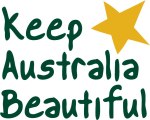Incorrect disposal and illegal dumping of rubbish costs our coast both environmentally and economically, but there are simple steps we can all take to reduce the impact.
Disposal of household waste in public bins, general waste contaminating recycling and illegal rubbish dumping are having a major toll on coastal environments and come at a huge financial coast to local authorities, consuming funds that could be spent elsewhere.

Great Ocean Road Coast Committee (GORCC) Coastal Reserves Manager Rod Goring said the problem was ongoing, despite work undertaken to encourage responsible rubbish disposal and the provision of recycling and general waste bins across campgrounds and coastal reserves.
“A large amount of household waste is often disposed of in public bins provided for beachgoers.
“Not only is this illegal, but it causes overflow and litter on our beaches is not only visually horrible but threatens coastal flora and fauna and the marine environment.
“Additionally, contamination of recycling is a constant issue, and we urge all coastal users to familiarise themselves with what can and can’t be recycled.
Recyclable materials include glass containers, some plastics, cardboards, paper and metal including steel or aluminum cans.
“Many may not realize that plastic bags, plastic wrap and food containers with food scraps, are not recyclable and cause contamination.
“Our contractors face heavy fines for delivery of non-recyclables to the depot and, unfortunately, some heavily contaminated bins have to be emptied into general waste and sent to landfill,” he said.
Equally concerning is the illegal dumping of rubbish directly onto coastal reserves, with large amounts of hard rubbish being discovered on our coast on a regular basis.
“From pianos and televisions through to paint cans and asbestos, it is unbelievable what people will leave on beautiful beaches that are so highly valued by the community,” said Mr. Goring.

Waste disposal sites are made available at several coastal locations and allow the drop off of household garbage and a range of recyclable materials.
“All coastal users, including campers, visitors and holiday home owners are encouraged to use these facilities and minimise the amount of rubbish that ends up on the beaches.
“The council also has drop –off collection points for holiday home owners at Torquay, Anglesea and Lorne,” said Mr.Goring
If you notice any illegal rubbish dumping or to report any rubbish or litter contact the GORCC office on 5220 5055, or the Surf Coast Shire on 5261 0600. Littering from vehicles can be reported to EPA Victoria by calling the Littering Hotline on 1800 372 842 or visiting http://www.epa.vic.gov.au.
This story featured in the Surf Coast Times Green the Coast Column.
Related blog posts:
 Rubbish dumping still a threat to our coast Rubbish dumping still a threat to our coast |

|
 Illegal rubbish dumping damages sensitive coast Illegal rubbish dumping damages sensitive coast |
 Keeping beautiful starts with you Keeping beautiful starts with you |